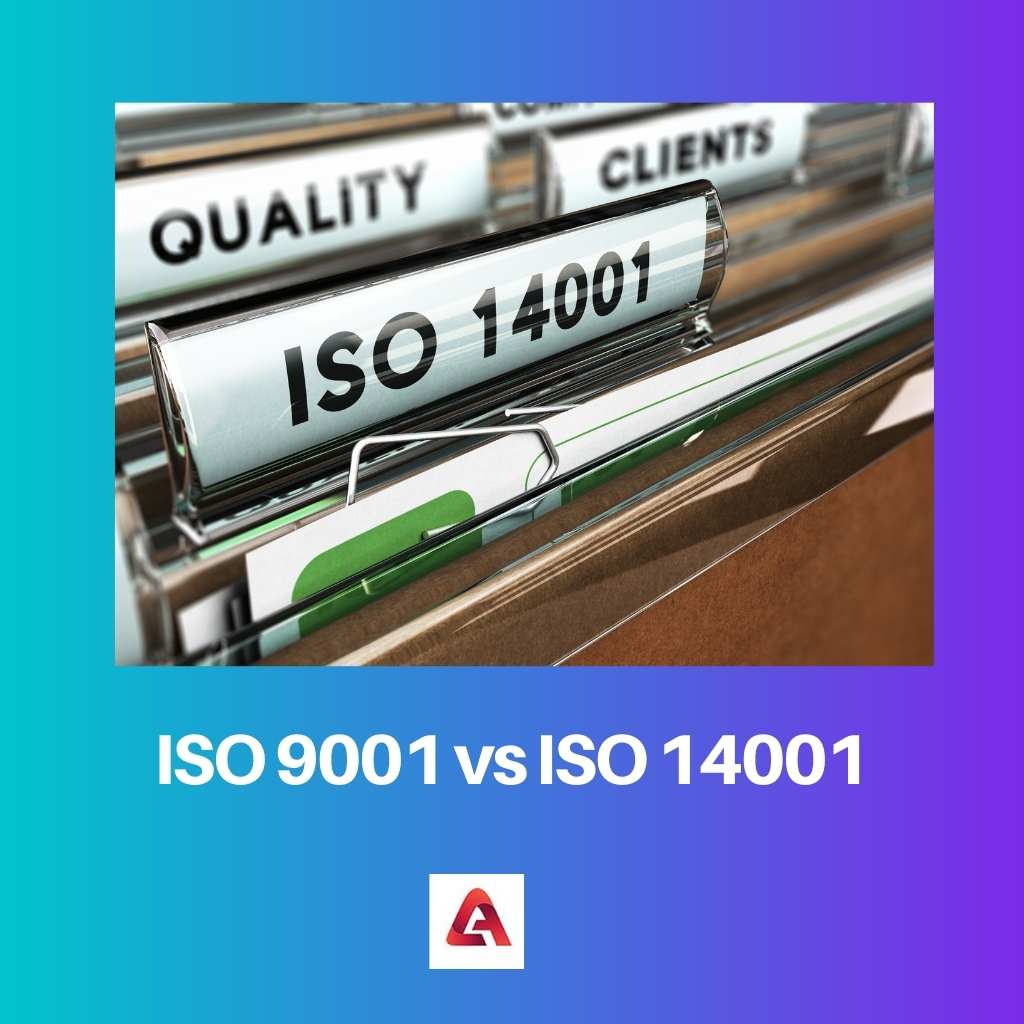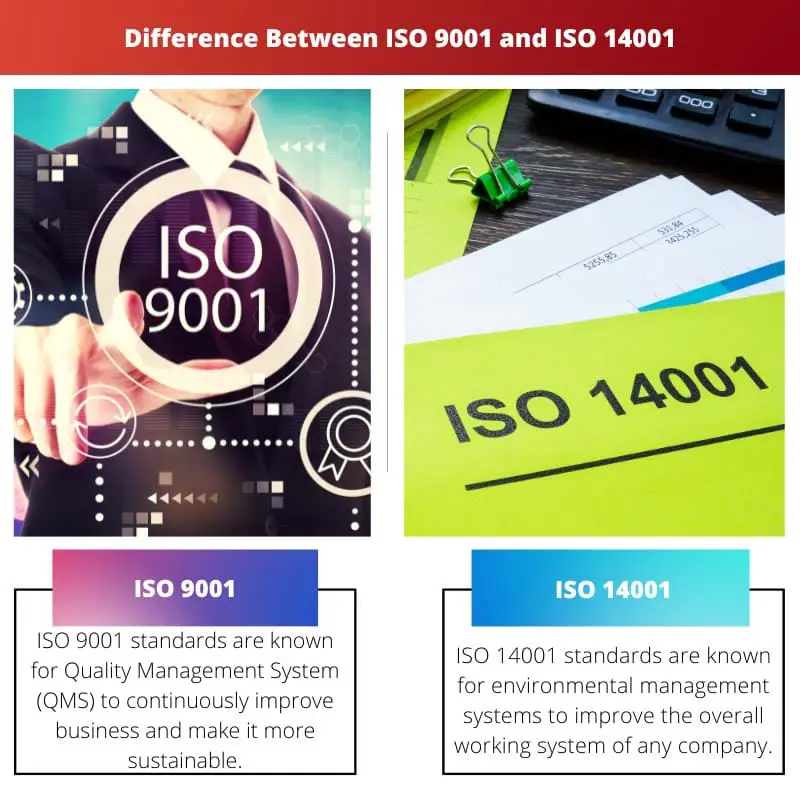The International Organization for Standardization (ISO) releases various sets of guidelines for both governmental and non-governmental bodies.
These guidelines help organizations maintain a certain standard to minimize the negative impact on the environment, create more sustainable approaches, improve customer relations, etc. It is optionable for any organization to follow these standards.
Key Takeaways
- ISO 9001 focuses on the quality management system of an organization, whereas ISO 14001 focuses on the environmental management system.
- ISO 9001 emphasizes customer satisfaction as the primary goal, while ISO 14001 aims to minimize the organization’s environmental impact.
- ISO 9001 is more suitable for organizations involved in manufacturing and services, whereas ISO 14001 applies to organizations involved in various industries, including manufacturing, construction, and healthcare.
ISO 9001 vs ISO 14001
ISO 9001 is a standard for quality management systems (QMS). It provides a framework for organizations to manage and improve their quality management processes. ISO 14001 is a standard for environmental management systems (EMS). It provides a framework for organizations to manage their environmental responsibilities.

Improving quality issues should be one of the main concerns of a company because it helps to satisfy the standards of the customers.
ISO 9001 certification helps companies to maintain certain quality standards and it is also a very powerful overall business improvement tool. To get ISO 9001 certified, one has to do formal training on ISO 9001.
ISO 14001 is concerned about the environmental management system so that the company’s processes and final products do not have any negative impact on the ecosystem.
Any organization can get ISO 14001 certified as it is an international standard and currently valid in 171 countries. ISO 14001 guidelines can be followed either in whole or in part.
Comparison Table
| Parameters of Comparison | ISO 9001 | ISO 14001 |
|---|---|---|
| Definition | ISO 9001 standards are known for Quality Management System (QMS) to continuously improve business and make it more sustainable. | ISO 14001 standards are known for environmental management systems to improve the overall working system of any company to minimize any impact on the environment. |
| Introduction | ISO 9001 was introduced in 1987 and its latest revised version was released in 2015. | ISO 14001 was introduced in 1996 and was last reviewed in 2015. |
| Principles | ISO 9001 has eight main principles to focus on. | The basic principle of ISO 14001 is a four-step cycle of the Deming (PDCA) cycle. |
| Certification | Getting ISO 9001 certification means customer satisfaction has improved due to better quality. | ISO 14001 certification implied minimization of waste generation, reduced pollution, etc. |
| Benefits | The main benefit of ISO 9001 is that the guidelines help in maintaining the good quality that has a positive effect on customers, business partners, and employees. | Waste reduction, cost reduction, improved brand image, and efficient use of resources. |
| Requirements | Doing a gap analysis and internally auditing the system is important before applying for ISO 9001 certification. | The requirement for ISO 14001 certification is that a company or an organization has to continuously improve its environmental issues. |
What is ISO 9001?
ISO 9001 signifies quality check which means that any company that is ISO 9001 certified is expected to continuously improve their quality management.
Continuously upgrading the standard of the product helps in improved customer satisfaction and can impress the potential customer base as well.
This helps in maintaining an overall healthy relationship with employees, customers, and business partners. This standard also helps in business improvement by organizing processes and making the business more efficient.
Various topics are covered by ISO 9001. It offers a process-oriented approach that does more than just quality management.
For example, ISO 9001 also sets guidelines for responsibilities of management, different ways to manage resources, organizing work environment, product realization, performing analysis, internal audit, taking preventive action, etc. for improving QMS.
In the latest version of ISO 9001 standard, i.e., ISO 9001 2015, leadership requirements have also been mentioned.
In the ISO 9000 family, ISO 9001 is the only standard that offers certification. To get certified, a company has to follow every rule and guidelines of ISO 9001, meet customer and regulatory requirements, maintain proper documentation, and proper cost analysis.
There are formal training courses offered for ISO 9001 and it is also mandatory for an organization to take.
What is ISO 14001?
ISO 14001 focuses on environmental management systems and it is the core standard on the ISO 14000 series. This standard was born after several discussions and debates in the United Nations conference mainly on the human environment.
Since the very beginning of industrialization, big companies have been exploiting the environment especially when it comes to waste disposal and emission of harmful gases.
Many aquatic lives have been destroyed due to improper waste disposal and the fertility of the soil in many places has also been lost.
This is the most important reason why ISO 14001 was established so that companies become more aware of how to operate in an environment-friendly way.
The principles of ISO 14001 are based on the famous PDCA (Plan-Do-Check-Act) cycle. The planning part requires establishing the objectives by doing a gap analysis.
The next step is implementing all the processes required mainly for operational control. The third step is monitoring the processes and reporting results and the fourth step is taking actions based on the results.
There are immense benefits for ISO 14001 because not only does it help to operate sustainably but also improves brand image. Some companies that are ISO 14001 certified are NIVUS GmbH, United Initiators Inc, LRQA, and many more.
Main Differences Between ISO 9001 and ISO 14001
- ISO 9001 standards are known for Quality Management whereas ISO 14001 standards are known for environmental management.
- ISO 9001 was introduced in 1987 whereas ISO 14001 was introduced in 1996.
- Getting ISO 9001 certification means customer satisfaction has improved due to better quality whereas ISO 14001 certification means minimization of waste generation, reduced pollution, etc.
- ISO 9001 has eight main principles whereas ISO 14001 is a four-step cycle of the Deming (PDCA) cycle.
- The main benefit of ISO 9001 is that maintaining good product quality has a positive effect on customers, business partners, and employees whereas ISO 14001 benefits by stopping the exploitation of resources and developing a cleaner environment.
